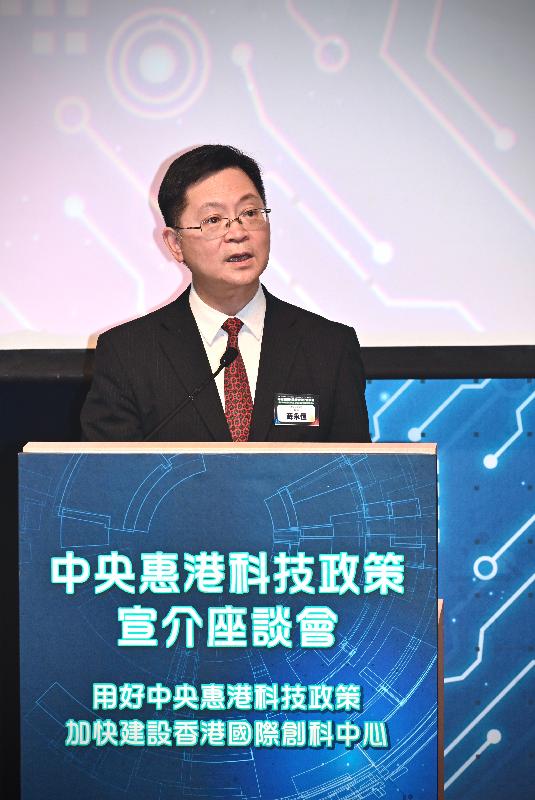HKSAR Government welcomes Ministry of Science and Technology's announcement of series of new measures benefitting Hong Kong (with photo)
******************************************************************************************
The seminar was held today at the Hong Kong Science Park. It was jointly organised by the Innovation and Technology Bureau, the Greater Bay Area Association of Academicians (GBAAA) and the Beijing-Hong Kong Academic Exchange Centre. Deputy Director of the Liaison Office of the Central People's Government in the HKSAR Mr Tan Tieniu gave a keynote speech at the seminar, and briefings were given by the MOST, the China Association for Science and Technology (CAST) and the National Natural Science Foundation of China. The measures benefitting Hong Kong include opening up more national-level science and technology programmes to Hong Kong, allowing young academics in Hong Kong to apply for the "Young Scientists Fund" under the National Natural Science Foundation of China, welcoming personnel and experts in Hong Kong's science and technology sector to participate in nationwide academic associations of the CAST as well as be admitted to the National Science and Technology Expert Database and the Award Assessment Expert Database, enhancing the mechanism on shared use of large-scale instruments and equipment for research and development (R&D) with Hong Kong, deepening science and technology exchanges between people in the Mainland and Hong Kong, and supporting Hong Kong to participate in the setting up of a National Center of Technology Innovation.
The Secretary for Innovation and Technology, Mr Alfred Sit, said, "On behalf of the HKSAR Government, I would like to express gratitude to the Central Government for its trust and support all along. We will make good use of the country's support, in particular the latest series of measures in the area of science and technology which benefit Hong Kong as announced by the MOST. Opening up more themes and projects under various science and technology programmes and funds as well as the Mainland's large-scale instruments and equipment to Hong Kong will help the local research sector obtain more resources to conduct R&D work. The participation of personnel and experts in Hong Kong's science and technology sector in nationwide academic associations of the CAST and different expert databases can also allow Hong Kong researchers to better utilise the strengths of Hong Kong and contribute to meeting the needs of the country.
"The National 14th Five-Year Plan indicates clear support for Hong Kong's development into an international I&T hub. Outstanding researchers in Hong Kong are eager to give play to the strengths of Hong Kong in basic research with a view to developing Hong Kong into a global influential I&T hub and contributing to building the country into one which is strong in science and technology. I look forward to the gradual implementation of respective new measures which will bring more impetus to the scientific research sector in Hong Kong, contributing to the development of the I&T development of the country and assisting in the building of the Greater Bay Area into an international I&T hub."
The current-term Government is committed to developing I&T while the Central Government has introduced a series of measures. These have provided significant support and valuable opportunities for the development of scientific research as well as I&T in Hong Kong. Significant examples include:
1. President Xi Jinping responded to the proposal made by the Hong Kong academicians of the Chinese Academy of Sciences (CAS) and the Chinese Academy of Engineering, allowing universities and research institutions in Hong Kong to apply for central fiscal science and technology projects and supporting the development of Hong Kong into an international I&T hub. In addition, the Central Government has subsequently supported these institutions to participate in projects under Guangdong technology programmes. These measures have promoted the cross-boundary remittance of Mainland science and research funding to Hong Kong. A cumulative amount of over RMB370 million has been approved by the Mainland for local universities and research institutions in Hong Kong to undertake R&D projects or establish laboratories.
2. The Central Government has strongly supported the development of the Shenzhen-Hong Kong Innovation and Technology Co-operation Zone at the Loop and introduced supporting policies to facilitate the flow of innovative elements, allowing the Co-operation Zone becoming an important platform for developing the Greater Bay Area into an international I&T hub.
3. The Central Government has relaxed the limitation on exporting Mainland human genetic resources to Hong Kong. So far, four Mainland branches established by Hong Kong's universities have been confirmed by the MOST to be meeting the specified requirements and participating under a pilot scheme.
4. In addition, according to the Memorandum of Understanding signed in November 2018 by the Chief Executive and the President of the CAS, Professor Bai Chunli, the affiliated institution of the CAS would set up R&D centres in the InnoHK Clusters.
5. The GBAAA, one of the organisers of today's seminar, is an organisation proposed by the Chief Executive at the first plenary meeting of the Leading Group for Development of Guangdong-Hong Kong-Macao Greater Bay Area held in August 2018, and its establishment was endorsed by the Central Government.
Ends/Tuesday, September 7, 2021
Issued at HKT 20:12
Issued at HKT 20:12
NNNN





